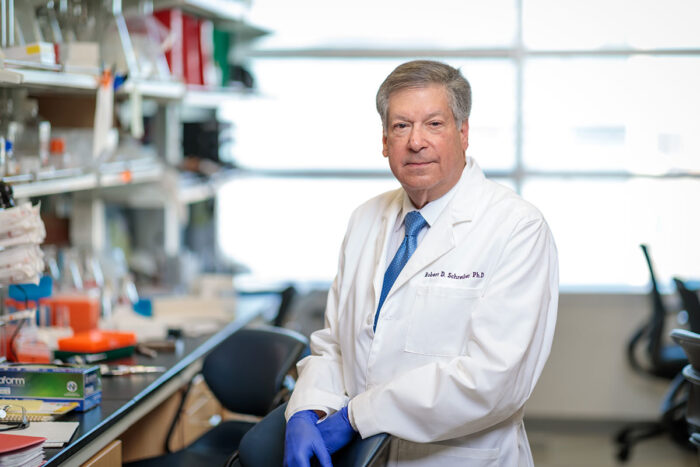Schreiber receives scientific innovator award
Immunobiologist honored for contributions to the field of cancer immunology
 Matt Miller
Matt MillerRobert Schreiber, PhD, of Washington University School of Medicine in St. Louis, is the 2024 Senior Scientist Winner of the Innovators in Science Award. The award recognizes his outstanding contributions to the field of cancer immunology.
Robert D. Schreiber, PhD, an internationally recognized scientist in cancer immunology at Washington University School of Medicine in St. Louis, has been named the 2024 Senior Scientist Winner of the Innovators in Science Award in Cancer Immunology. The award is given by the New York Academy of Sciences and sponsored by Takeda Pharmaceuticals.
Schreiber, the Andrew M. and Jane M. Bursky Distinguished Professor and a professor of molecular microbiology and of pathology & immunology at Washington University, was chosen by a panel of some of the world’s leading researchers in immunology. He will receive the award in April at the 2024 Innovators in Science Award Ceremony in Boston.
“We are thrilled that Robert Schreiber’s foundational work on the immunobiology of cancer is being recognized with this honor,” said David H. Perlmutter, MD, executive vice chancellor for medical affairs, the George and Carol Bauer Dean, and the Spencer T. and Ann W. Olin Distinguished Professor. “Bob has been at the forefront of the revolution in understanding how cancer evades the immune system and, in turn, identifying targets for immunotherapies that have led to profound improvements in cancer outcomes. He had the vision years ago to realize the potential of basic science advances in mouse models for translation into human immunotherapies. His ongoing work on new cancer vaccines and immune-based treatments portends even greater impact for cancer patients in the coming years.”
The award recognizes an outstanding senior scientist and a promising early-career scientist for their contributions to science in one of several therapeutic areas that rotate: neuroscience, regenerative medicine, rare diseases, gastroenterology and cancer immunology. This is the inaugural year for the cancer immunology award.
“Now, more than ever, the academy is committed to science for the public good,” said Nicholas B. Dirks, PhD, president and CEO of the New York Academy of Sciences, in a statement. “The Innovators in Science Award, which was developed as a partnership between the academy and Takeda, recognizes transformative researchers who have developed science-based solutions to address global concerns. We are delighted to call Takeda our partner in the drive to improve human health through innovation.”
Also a co-leader of the tumor immunology program at Siteman Cancer Center, based at Barnes-Jewish Hospital and Washington University School of Medicine, Schreiber is a pioneer in the fields of cancer immunobiology and immunotherapy. He has made key contributions in defining the immune system’s role in tumor development, as well as major discoveries in finding ways to harness the immune system to treat cancer.
Schreiber also is the founding director of the Bursky Center for Human Immunology & Immunotherapy Programs at the School of Medicine. He and his team showed that immune lymphocytes are instrumental in tumor surveillance — eliminating cancer cells early in their development. However, some tumors develop an ability to escape these immune cells, the final step in a process that Schreiber dubbed cancer immunoediting. This process can make tumor cells invisible to the immune system’s surveillance.
To make such cancer cells visible again, Schreiber and his team have led the field in the use of genetic sequencing to identify mutant proteins unique to a patient’s tumor. In work by Schreiber and others at Washington University and elsewhere, these tumor-identifying proteins have been used to develop personalized vaccines, some of which have been investigated in clinical trials for patients with cancers of the breast, brain, lung, pancreas, prostate, skin and certain forms of lymphoma.
Also noted for his expertise in basic immunology, Schreiber earned his doctoral degree in biochemistry from the State University of New York at Buffalo. He continued his training in immunology as a postdoctoral researcher at the Scripps Research Institute in La Jolla, Calif., where he became a faculty member in 1976. He was recruited to the faculty of Washington University School of Medicine in 1985.
“It is a great honor to be recognized with this award,” said Schreiber, who also directs a training grant funded by the National Cancer Institute that is focused on the immunobiology and cell biology of cancer. “The cancer immunotherapy field has progressed at an exciting pace in recent years. I have been so lucky to have worked with great team members over the 39 years I’ve been at Washington University. I am hopeful that what we have learned about cancer and immunology will continue to transform cancer care and offer better therapies for people who develop this difficult disease.”
Shreiber is the second researcher from Washington University to be recognized with this award in the past two years. Gut microbiome pioneer Jeffrey I. Gordon, MD, the Dr. Robert J. Glaser Distinguished University Professor, received this honor in 2022 for his contributions to the field of gastroenterology.







